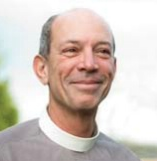Passover and Holy Week are ancient, mysterious and sacred traditions.
You may be asking yourself, what is going on? What is all the fuss about?
Good question.
The answer is not easy to explain. The best I can do is teach from my experiences as a chaplain and teacher in an Episcopal school.
If you listen to the New Testament stories read during Lent, you hear a lot of complaining about how the Jews killed Jesus, the Jews did this, and the Jews did that. The Jews don’t know Christ. Isn’t it sad about all the non-believers in this world, etc., etc., etc.
I remember thinking these things when I was a student. But I decided a long time ago that it just wasn’t that important to me to point fingers at each other. We do that enough in our every day affairs without bringing it into the Church. And so I concluded that when the Gospels say that the Jews did this, and the Jews did that, and that the Jews were the ones who killed Jesus, what it should mean, in the here and now, is that it was Jesus’ own people—those who loved him, supported him, cheered him into Jerusalem as their king—those same people condemned him to death just a few days later. Remember that Jesus was a Jew.
What a schizophrenic community he lived in. Are we really any different? Don't we turn on our friends and colleagues from time to time when what we want matters more to us than their feelings? Don't we, from time to time, accuse our school administrators, civic and church leaders, and even our parents when things don't the way we want them to? How quick we are to blame our misfortunes on others.
Jesus preached and taught his own people, and his own people did not receive him. His own friends abandoned him. He took the fall. He was obedient even unto death.
And we cannot blame them entirely. Jesus had a part in it. They swept him into the city with hosannas and shouts of victory. They called him “Messiah” and “Savior!” They fantasized that he was going to overthrow the Roman occupation. They wanted a king.
And he was amazed and anxious. He looked them in the eye and said, “Wait a minute. Is that what you think this is about? Kingship? Power? Overthrow? I’m sorry. Social change does not happen by force. It is not something we can legislate. It has to come from the people’s hearts.”
Deep in our hearts, we know this. All schools have rules, handbooks, policies. But even the schools with the thickest handbooks have problems. It is not the Student Handbook that makes a school a clean school, or a drug-free school, or a school that does not tolerate bullying, prejudice or hate. Rather, it is the culture. It is the student body's commitment to something deeper.
And so Jesus came into the city, asking what in the world are you looking for? What is it you are willing to sacrifice in order to make it happen? And the people were so full of their own shouts for kingship and overthrow, that they did not hear him. They could not follow him because they could not process his message, feel the power of his commitment, or believe in his weapons of choice: empathy, peace, compassion and love.
They missed it. And so the triumph turned to disappointment, and the disappointment became blame, and the blame became scapegoating, which ultimately turned into loathing and condemnation.
It is easy to say, it wasn’t me; I didn’t do anything; but the truth is that we are all responsible for the Passion and Death of Jesus and the example he left us: a ministry of kindness, compassion, service, truth, generosity, reconciliation and love.
Jesus suffered for others—for us. He died for others—for us. He came into the city in glory, and by week’s end he was nailed to a cross.
But that is not the end of the story.
The late Urban T. Holmes, theologian and seminary dean, asked which is better: When someone is grief-stricken over the death of a loved one, to offer them a tranquilizer for instant relief, or to spend whatever time is necessary supporting them as they deepen their consciousness of their ambiguous feelings and concerns? In this impatient world, we often choose the first way because it gets results. But in a school like the one where I live, students are reminded that there is more to transformation than being pain free. A tranquilizer does not last.
Episcopal schools are not afraid of tradition. In a world where most schools have swept religious traditions and rituals aside, Episcopal schools offer something counter-cultural. Each spring, Episcopal schools plumb the depths of the collective moral consciousness and test the spiritual strength of the community. We do this because we believe it is important to enter into the mysterious community of deep memory that each of us might deepen our understanding of who we are and what we are meant to be.
Thursday, April 21, 2011
Subscribe to:
Post Comments (Atom)

No comments:
Post a Comment